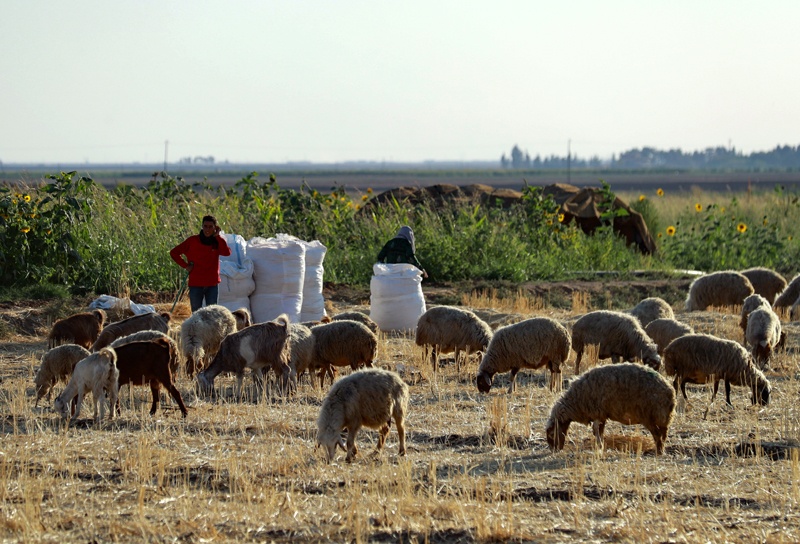 QAMISHLI, Syria: A young Syrian shepherd watches as his flock grazes in a harvested wheat field in the countryside of the northeastern city of Qamishli.—AFP
QAMISHLI, Syria: A young Syrian shepherd watches as his flock grazes in a harvested wheat field in the countryside of the northeastern city of Qamishli.—AFP
TAL SHAEER, Syria: After Syrian farmer Abdelbaqi Souleiman lost his last wheat crop to a wildfire, he had hoped for a better harvest this summer. But this spring there was hardly any rain. "Last year the field I planted was burnt to the ground," said the 48-year-old. "This year there wasn't enough rain, and we didn't harvest any wheat." As man-made climate change increases the likelihood of drought and wildfires worldwide, Syria has also been hit hard by low rainfall this year, especially in its breadbasket Hasakeh province.
In the Kurdish-run northeastern region, dismal wheat harvests have raised alarm about food security in a war-torn country where 60 percent of people already struggle to buy food. In Hasakeh, humanitarian agencies estimate crop production to have dropped by more than 95 percent compared to last year in large parts of the province.
Souleiman said the lack of downpour, coupled with the high price of fuel for irrigation, seeds and fertilizer, had made growing the rain-fed cereal a near mission impossible. "At this rate, we'll have to stop growing wheat," he said in the village of Tal Shaeer. "Farmers are going to have to start planting herbs like coriander and cumin because it's cheaper and they sell for more."
'Selling our women's gold'
Outside the town of Qahtaniyah in the same province, Hajji Mohammed, 71, said he and his neighbors had also fallen on rough times. "Farming has become a loss-making business," said the agricultural worker of 45 years in the village of Kardeem Haleema. "If there's no rain this year, most people will move away." After years of losses, the family had next to no resources left with which to launch into another season.
"We're trying to sell our women's gold or furnishings so we can buy the seeds," he said. Before the war erupted in 2011, Syria produced up to 4 million tons of wheat a year-enough to feed its entire population, but harvests have since plunged to record lows, increasing dependence on imports.
The agriculture minister in Damascus said last month the country produced 900,000 tons of the grain this year, less than half of the two million tons needed. Salman Barodo, co-president of the economy and agriculture commission with the Kurdish authorities, said this year's harvest had fallen far short of demand for the region's bakeries. "In previous years, we'd reap more than 600,000 tons of wheat," he said. It was enough for flour, seeds for the following season, and a little left over in reserve. "But this year it was just 184,000 to 185,000."
Harvest 'very low'
The poor harvest comes as the whole of northeast Syria is already facing a humanitarian disaster this year, aid agencies have warned, as low rainfall has also drastically depleted water levels along the Euphrates river. This has threatened electricity production and drinking water supplies, and complicated access to the river for irrigation.
In the neighboring province of Raqa, 42-year-old wheat farmer Ahmed Al-Humaidi said he had briefly considered switching to irrigation to save his crop. "We thought of drawing water from the Euphrates... but we were not able to because of the high cost" of equipment and fuel, he said in the village of Salhabiyah. Mike Robson, the representative of the Food and Agriculture Organization in Syria, said the rainy season ended unusually early in March this year. High temperatures the following month then prevented the grains from filling out properly.
"We don't yet have the full final numbers for the harvest for this year, but we're expecting it to be very low-possibly about half the figure for last year," he said. This would likely mean more price hikes, and more families struggling to feed themselves. Already, the World Food Programme said in February that a staggering 12.4 million people in Syria-out of an estimated population of 20 million-were food insecure. "We're expecting a further increase," Robson said. - AFP




